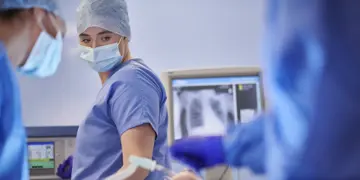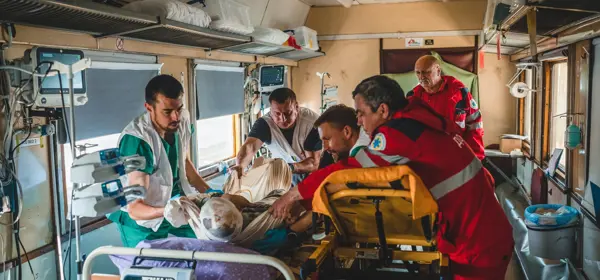
Support for rebuilding education programmes
BMA seeks help from medical royal colleges to ensure future of medicine in Gaza
The war in Gaza represents one of the greatest humanitarian disasters facing the world today.
From the outset of the conflict in October 2023, following the horrific Hamas attack on Israeli civilians, the enormous loss of life and destruction of homes and infrastructure, including hospitals and healthcare facilities, has resulted in a horrendous human cost.
The UN’s latest estimate is that almost two million people in Gaza, many of whom are women and children, have been displaced by the violence, with fewer than half (47 per cent) of Gaza’s hospitals classed as partially functional. Ten of thousands have been reported killed, including hundreds of medical professionals and aid workers.
For its part, the BMA has long expressed its deep concern with the effects of the war on civilians and for the ability of doctors and other healthcare professionals to deliver care safely and effectively.
With the conflict preventing access to essentials such as water, electricity, and medical supplies, as well as the destruction of healthcare sites, the BMA has noted that doctors and other staff face ‘exceptionally challenging working circumstances’ at a time when routine healthcare delivery ‘has been brought to a standstill’.
International support
It was against this backdrop that doctors gathering at this year’s BMA annual representative meeting in Belfast, urgently put forward a series of motions concerning the war and the future of Gaza’s medical profession and health service.
One such motion endorsed by the association’s representative body emphasised how the level of destruction to Gaza’s health system would necessitate ‘unprecedented and extensive international medical support’ if it were to ever recover.
To this end, the BMA has pledged to lobby royal medical colleges to support Palestinian efforts to rebuild and re-establish undergraduate and postgraduate education programmes, to ensure that there is a next generation of doctors serving the people of Gaza.
The BMA will also press colleges and the UK Government to assist Palestinian medical students and doctors seeking to come to the UK to develop their skills, through financial support and assistance in obtaining visas.
Healthcare obligation
BMA medical students committee representative for Edinburgh medical school, Elgan Manton-Roseblade who proposed the successful motion, said he believed the BMA had an undeniable responsibility to defend rights to healthcare in Palestine.
He said: ‘By endorsing this policy, the representative body has demonstrated that the humanitarian crisis in Palestine is an important issue to BMA members.
‘As the medical profession, we are uniquely placed to make our voices heard about the healthcare crisis in Gaza. For me and many other members, it’s precisely because of our medical backgrounds that we feel so strongly about our duty to stand up and speak up.
‘Rebuilding the healthcare system in Gaza will take decades and will require international collaboration in training and education,’ he added.
‘There are no universities left and capacity for specialist medical training is limited. Meanwhile, patient needs have drastically changed and many specialists to address such needs have been killed or injured.
‘In light of this, funded UK clinical attachments for Palestinian doctors and medical students, alongside educational support from royal colleges, are achievable aims.’
Humanitarian assistance
A second motion brought before the ARM saw representatives back calls for the BMA to reaffirm its commitment to medical humanitarianism and, in light of the apparent targeting of hospitals and healthcare staff during the conflict, to condemning all violations of medical neutrality.
This call includes the continued lobbying for the protection of healthcare workers and their patients from hostilities, urgent investigations into the deaths of staff and the destruction of medical schools and infrastructure and pressing the UK government to urge Egypt and Israel to allow access for full humanitarian assistance and medical supplies to the people of Gaza.
The motions passed at ARM underline previous calls made in a detailed position statement by the BMA regarding the crisis, and form part of a continuous expression of will from the association’s membership that the BMA speak up to protect colleagues across the world and the right to health.
In recent years the BMA has raised concerns regarding the targeting of medical professionals by the Tatmadaw in Myanmar following the military coup in 2021 and the denial of healthcare to anti-government protestors in Nicaragua.
The association has also spoken out about medical involvement in serious human rights abuses against the Uyghurs in China and the suppression of the Turkish Medical Association and Korean Medical Association by their respective governments.
Most recently, the BMA condemned the attack on a children’s hospital in Kyiv, noting medical facilities are protected under the Geneva Conventions.
The BMA’s work challenging the situation in Israel and Gaza, supported further by these ARM motions, is one thread of a much broader tapestry of engagement with international human rights issues. It is emblematic of the BMA’s members’ commitment to their colleagues globally, as well as the right to health.


